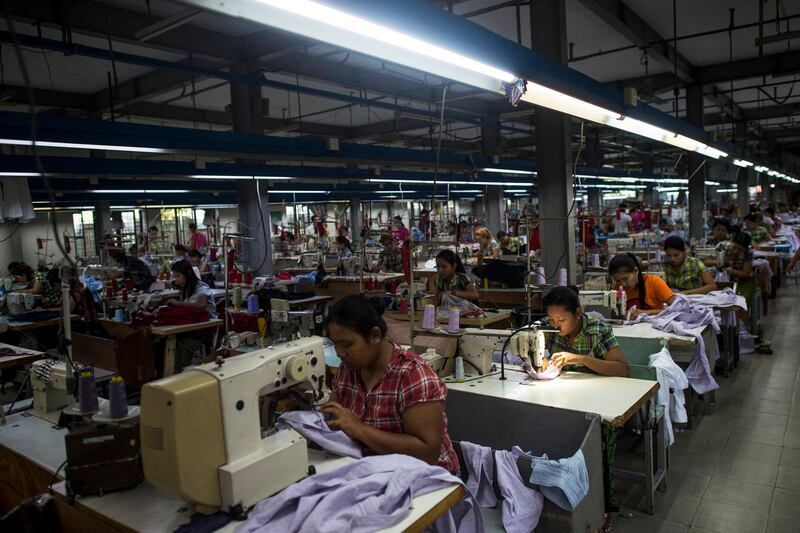The Myanmar junta’s latest attempt to address forced labor has been met with fierce criticism, as labor advocates denounce the measure as nothing more than a smokescreen.
The junta announced the “National Complaint Mechanism” in August designed to allow victims to “safely contact and complain” to various governmental bodies.
The junta’s mechanism comes as Myanmar faces scrutiny over its compliance with International Labor Organization, or ILO, standards on forced labor and freedom of association.
Economic turmoil, driven by rampant inflation and currency devaluation, has made basic necessities like rice and oil unaffordable for many in Myanmar already on low wages.
The country's withdrawal of multinational corporations with ethical sourcing policies and an influx of Chinese companies, which workers say are far more difficult to negotiate with, has only worsened the situation.
In the aftermath of a 2021 military coup, the ILO has reported “far-reaching restrictions on the exercise of basic civil liberties and trade union rights” and found no concrete action in response to their recommendations.
RELATED STORIES
[ H&M latest to call it quits in phased exit from MyanmarOpens in new window ]
[ Complaints over Myanmar’s manufacturing sector tripled in 2023, report findsOpens in new window ]
[ As Chinese money flows in, Myanmar garment factory conditions worsenOpens in new window ]
‘Just a farce’
Labor advocates are far from impressed with the junta's new measure, with some pointing out that the new measure holds no value for workers, as it was established by a military that frequently deploys soldiers to factories to intimidate dissatisfied workers.
The same military has banned over a dozen major trade unions and has imprisoned or killed hundreds of labor leaders, activists say.
“It’s like the fox being put in charge of the chicken coop,” said Maung Maung, president of the Confederation for Trade Unions Myanmar, or CTUM, who argued that the junta’s measure offers no real protection under a regime notorious for violating labor rights.
“The military are the people who violate human rights, workers’ rights, in our country. The military setting up the National Complaints Mechanism is just trying to lie to themselves, to the people of Burma and to the ILO and the ILO constituents. I’d say it's just a farce.”
Others believe the junta’s measure could simply be an attempt to avoid more severe international repercussions.
In June, the ILO’s governing body asked its director-general to propose steps to ensure Myanmar complies with labor standards. One option is to invoke Article 33 of the ILO’s constitution, which allows it to make recommendations if a government ignores rulings from a Commission of Inquiry or the International Court of Justice.
The ILO, in a report from the June meeting, listed possible actions, such as excluding Myanmar from its meetings until it complies, issuing annual reports on progress, and urging international organizations to review their partnerships and stop any support that contributes to forced labor or restricts union freedoms.
The Junta announced that forced labor victims could report through the National Complaint Mechanism to the ILO Liaison Office in Yangon.
However, the ILO has not agreed to collaborate with the military administration on this mechanism, according to a source familiar with the matter who spoke to RFA anonymously.

Divided views
But since the ILO can also recommend sanctions under Article 33, some workers fear the immediate impact on their livelihoods.
“They’re going to force workers to go hungry if they support comprehensive sanctions,” said a labor leader at a garment factory, who asked to remain anonymous for security reasons.
“Our salary is not enough, we are trying every day to survive. We’re low-income people, so we rely on our job everyday.”
Other garment and shoe factory labor leaders interviewed by Radio Free Asia agreed, saying that workers supported efforts to end military rule but couldn’t afford to support calls for sanctions.
“I’m a worker in the industrial zone and also low-income,” said another garment worker, who also declined to be identified as talking to the media.
“I know the disadvantages of the comprehensive economic sanctions, so I don’t support them,”
“Sanctions don’t work for the military but they do create hardships for the labor force.”
Still, Maung Maung of the CTUM, one of the country's largest unions with 65,000 members, said he supports sanctions, if necessary.
Much of the labor force has already left the country and those remaining often can’t resolve their disputes without being jailed or threatened, he lamented.
“Under martial law, nothing functions like it was before. [For] trade unions, were there any free elections? Has anyone made any statements on the cost of living rising?” he said.
“I would say all of those things that are not being done also disqualify this complaint mechanism.”
Edited by Taejun Kang.
